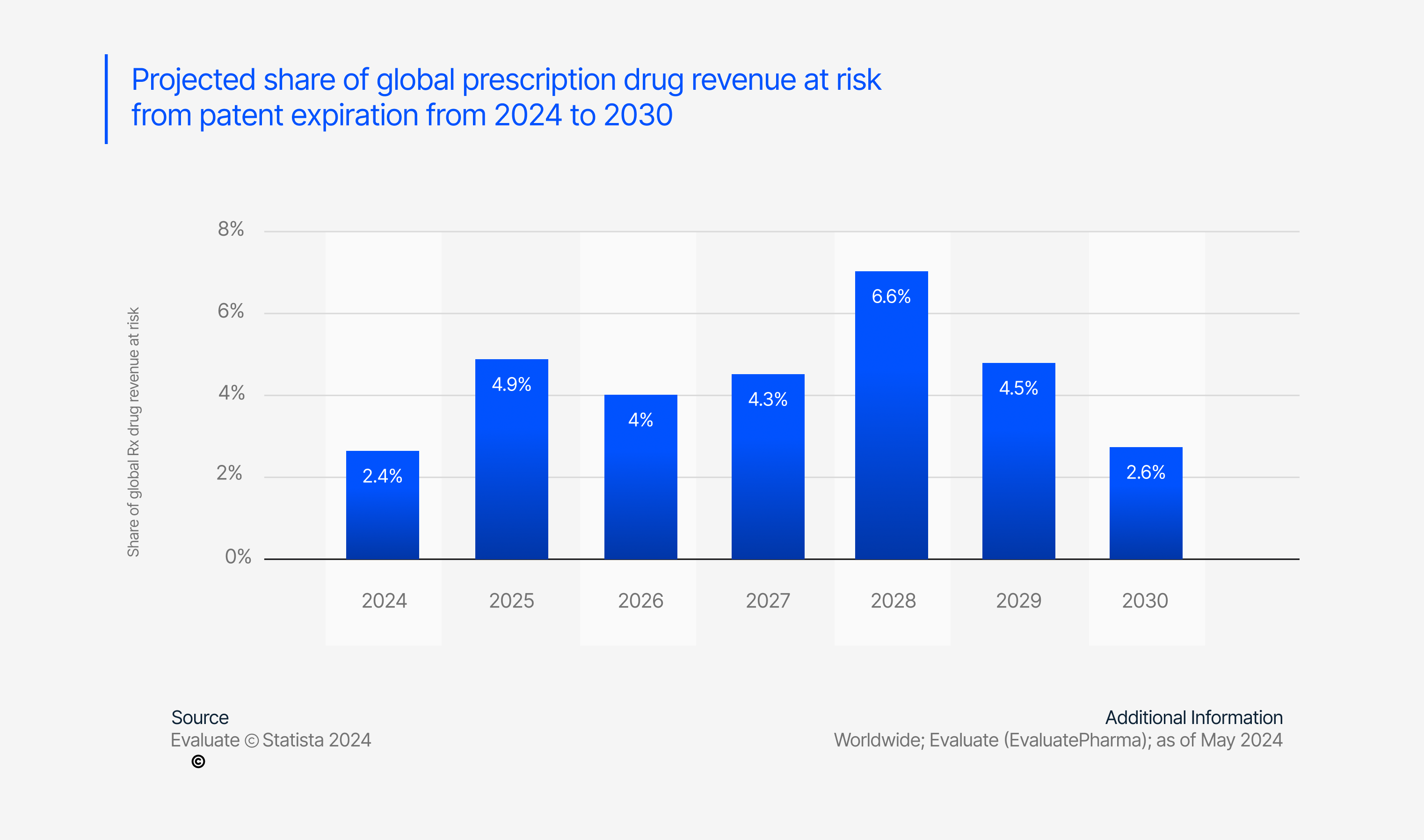The pharmaceutical landscape is poised for a wave of patent expirations. According to the U.S. Food and Drug Administration (FDA), the introduction of generic competitors can dramatically slash drug prices. Just one generic entry can lead to a 39% price drop on average, while four generics can drive down prices by a whopping 79%. These reductions will help save billions of dollars for patients in the US and around the world.
A report published in Journal of Chemical and Pharmaceutical Research suggests that “patent expirations profoundly impact the pharmaceutical industry, influencing economic performance, market competition, innovation incentives, and broader industry dynamics”.

Let's take a look at some of the key medications facing patent expirations in the years to come:
1) Keytruda (Merck): This anti-cancer powerhouse, which topped global drug sales in 2024 with $29.5 billion, sees its patents expiring in 2028. This means potential future competition and lower prices for cancer patients.What this drug does
Keytruda works by helping the body's own immune system fight cancer. It specifically targets a protein called PD-1 (programmed cell death protein 1) on T-cells (a type of immune cell).
Some cancer cells can evade the immune system by activating PD-1, which essentially "turns off" the T-cells. Keytruda blocks this interaction, allowing the T-cells to recognize and attack the cancer cells.
Why it's popular
Keytruda has been approved for the treatment of many different types of cancer, including melanoma, lung cancer, bladder cancer, head and neck cancer, and many more. In fact, Keytruda's popularity can be attributed to its ability to enable the body's immune system to fight a wide range of cancers, often with improved patient outcomes.
2) Trulicity (Eli Lilly): Before the rise of Ozempic, there was Trulicity. This GLP-1 drug, used for type 2 diabetes and heart health, generated over $5 billion in revenue in 2024. Its U.S. patent expires in 2027, potentially paving the way for more affordable treatment options.What this drug does
Trulicity is a GLP-1 receptor agonist, suggesting it mimics a natural hormone that helps the body release insulin after eating. It also slows down stomach emptying and reduces glucagon secretion.
Why it’s popular
The drug is known for its convenience, as it’s administered once weekly. Trulicity also helps lower AIC levels, and it can also lead to weight loss, which is good for many people with type 2 diabetes. In addition, the drug also been shown to reduce the risk of major cardiovascular events with type 2 diabetes.
3) Ibrance (Pfizer): A crucial breast cancer medication, Ibrance brought in $4.3 billion in sales last year. Its patent is set to expire in 2027, which could lead to substantial cost reductions for patients currently paying over $15,000 for a 21-capsule supply.What it does
Ibrance is a cyclin-dependent kinase (CDK) 4/6 inhibitor, meaning it works by blocking proteins called CDK 4 and 6, which play a role in cell division. It is specifically used to treat hormone receptor (HR)-positive, human epidermal growth factor receptor 2 (HER2)-negative advanced or metastatic breast cancer.
Why it's popular
Ibrance significantly reduces progression-free survival in women with this specific type of breast cancer. By slowing the cancer progression, the drug offers patients a better quality of life.
4) Eliquis (Bristol Myers Squibb): This top-selling blood thinner, with $9.6 billion in 2024 sales, faces patent expiration in 2026. Notably, it's also one of the drugs subject to Medicare price negotiations, already resulting in a 56% price drop for beneficiaries.What it does
Eliquis works by inhibiting Factor Xa, a key protein involved in blood clotting. The drug reduces the risk of stroke and blood clots in people with atrial fibrillation, an irregular heartbeat.
Why it's popular
Eliquis is an effective alternative to older anticoagulants like warfarin, often requiring less frequent monitoring. The drug has also shown to have a good balance of effectiveness in preventing blood clots, when compared to some other anticoagulants. It’s very commonly prescribed, and is therefore readily available.
5) Farxiga (AstraZeneca): With $7.7 billion in sales in 2024, Farxiga, used for diabetes, heart failure, and kidney disease, sees its patents expiring this year. This means generics could arrive very soon.What Farxiga does
Farxiga belongs to a class of drugs called sodium-glucose co-transporter-2 (SGLT2) inhibitors. These drugs work in the kidneys by preventing the reabsorption of glucose back into the bloodstream. Resulting in excess glucose being eliminated through urine, which lowers blood sugar levels.
Why it's popular
In addition to its blood sugar-lowering effects, Farxiga has shown significant benefits in protecting the kidneys and heart. Clinical trials have shown that it can slow the progression of chronic kidney disease and reduce the risk of cardiovascular events.
6) Opdivo (Bristol Myers Squibb and Ono Pharmaceutical): Another cancer treatment giant, Opdivo, generated $9.3 billion in global sales in 2024. Its patent expires in 2028.What Opdivo does
Opdivo is an immunotherapy that blocks PD-1, a protein on T-cells, allowing T-cells to attack cancer cells that normally evade the immune system by expressing PD-L1. Essentially, Opdivo "releases the brakes" on the immune system, enabling it to fight cancer.
Why it’s popular
Opdivo's popularity comes from its ability to use the body's own immune system to fight a wide range of cancers, often leading to improved survival rates compared to traditional treatments.
7) Xarelto (Bayer and Johnson & Johnson): With $2.3 billion in sales, this blood thinner saw its main patent expire this February, and the FDA has already approved the first generic version.What it does
Xarelto works by inhibiting Factor Xa, a key clotting factor, preventing blood clot formation.
Why it’s popular
Its popularity stems from its oral administration (easier than injections), predictable dosing, and effectiveness in preventing and treating blood clots in conditions like atrial fibrillation, deep vein thrombosis, and pulmonary embolism, as well as reducing stroke risk.
8) Ozempic (Novo Nordisk): The weight-loss sensation, Ozempic, grew 26% to $16.7 billion in 2024. While its U.S. patent lasts until 2032, it's also subject to Medicare price negotiations, which could affect its cost sooner. The global patents i.e China, India, Brazil etc. are set to expire 2026.What it does
Ozempic (semaglutide) is a medication that mimics a natural hormone called GLP-1. It increases insulin release, decreases glucagon secretion (which raises blood sugar), and slows stomach emptying, leading to lower blood sugar and weight loss.
Why it’s popular
Its popularity comes from its effectiveness in managing type 2 diabetes and promoting significant weight loss, leading to off-label use for weight management.
Conclusion
These imminent patent expirations may potentially deliver huge cost savings to patients and ensure increased access to essential medications. As generic competition finds its way into the market, consumers can expect to see a welcome reduction in drug prices, offering much-needed respite from the burden of high medication costs. In addition, new producers of generics will emerge to cash in on the billion-dollar opportunities enabling new winners to emerge in regional and local markets. Keep an eye out for companies launching these generic and their ability to capture market share. Ability to scale generic in widely accepted drugs may potentially mean greater profitability and price performance.
Contributors

Adeel Ahmed
Research Editor

Share With